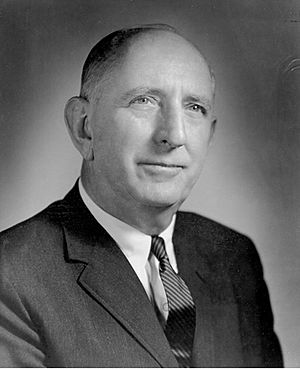Richard Russell, Jr. facts for kids
Quick facts for kids
Richard Russell, Jr.
|
|
|---|---|
 |
|
| President pro tempore of the United States Senate | |
| In office January 3, 1969 – January 21, 1971 |
|
| Preceded by | Carl Hayden |
| Succeeded by | Allen J. Ellender |
| Chair of the Senate Committee on Appropriations | |
| In office January 3, 1969 – January 21, 1971 |
|
| Leader | Mike Mansfield |
| Preceded by | Carl Hayden |
| Succeeded by | Allen Ellender |
| Chair of the Senate Committee on Armed Services | |
| In office January 3, 1955 – January 3, 1969 |
|
| Leader | |
| Preceded by | Leverett Saltonstall |
| Succeeded by | John C. Stennis |
| In office January 3, 1951 – January 3, 1953 |
|
| Leader | Ernest McFarland |
| Preceded by | Millard Tydings |
| Succeeded by | Leverett Saltonstall |
| United States Senator from Georgia |
|
| In office January 12, 1933 – January 21, 1971 |
|
| Preceded by | John S. Cohen |
| Succeeded by | David H. Gambrell |
| 66th Governor of Georgia | |
| In office June 27, 1931 – January 10, 1933 |
|
| Preceded by | Lamartine Griffin Hardman |
| Succeeded by | Eugene Talmadge |
| Member of the Georgia House of Representatives | |
| In office 1921–1931 |
|
| Personal details | |
| Born |
Richard Brevard Russell Jr.
November 2, 1897 Winder, Georgia, U.S. |
| Died | January 21, 1971 (aged 73) Washington, D.C., U.S. |
| Political party | Democratic |
| Parents |
|
| Relatives | Robert Lee Russell (brother) |
| Alma mater |
|
| Profession | Attorney |
| Military service | |
| Allegiance | |
| Branch/service | |
| Unit | Reserves |
| Battles/wars | World War I |
Richard Brevard Russell Jr. (November 2, 1897 – January 21, 1971) was an American politician. A member of the Democratic Party, he served as the 66th Governor of Georgia from 1931 to 1933 before serving in the United States Senate for almost 40 years, from 1933 to 1971. Russell was a founder and leader of the conservative coalition that dominated Congress from 1937 to 1963, and at his death was the most senior member of the Senate. He was for decades a leader of Southern opposition to the civil rights movement.
Born in Winder, Georgia, Russell established a legal practice in Winder after graduating from the University of Georgia School of Law. He served in the Georgia House of Representatives from 1921 to 1931 before becoming Governor of Georgia. Russell won a special election to succeed Senator William J. Harris and joined the Senate in 1933. He supported the New Deal early in his Senate career but helped establish the conservative coalition of Southern Democrats. He was the chief sponsor of the National School Lunch Act, which provided free or low-cost school lunches to impoverished students.
During his long tenure in the Senate, Russell served as chairman of several committees, and was the Chairman of the Senate Committee on Armed Services for most of the period between 1951 and 1969. He was a candidate for President of the United States at the 1948 Democratic National Convention and the 1952 Democratic National Convention. He was also a member of the Warren Commission.
Russell supported racial segregation and co-authored the Southern Manifesto with Strom Thurmond. Russell and 17 fellow Democratic Senators, along with one Republican, blocked the passage of civil rights legislation via the filibuster. After Russell's protégé, President Lyndon B. Johnson, signed the Civil Rights Act of 1964 into law, Russell led a Southern boycott of the 1964 Democratic National Convention. Russell served in the Senate until his death from emphysema in 1971. He was never married and had no children.
Early life
Russell enrolled in the University of Georgia School of Law in 1915 and earned a Bachelor of Laws (LL.B.) degree in 1918. While at UGA, he was a member of the Phi Kappa Literary Society.
Legacy
Russell was seen as a hero by many of the pro Jim Crow South. While undoubtedly a skilled politician of immense influence, his legacy is marred by his lifelong support of white supremacy. Russell publicly said that America was “a white man’s country, yes, and we are going to keep it that way.” He also said he was vehemently opposed to “political and social equality with the Negro.” Russell also supported poll taxes across the South and called President Truman's support of civil rights for black Americans an “uncalled-for attack on our Southern civilization."
Russell has been honored by having the following named for him:
- The Russell Senate Office Building, oldest of the three U.S. Senate office buildings. In 2018, Senate minority leader Charles Schumer called for the renaming of the building with the name of recently deceased Senator John McCain.
- The Russell Auditorium at Georgia College and State University in Milledgeville, Georgia.
- Richard B. Russell Dam and Lake, part of the Richard B. Russell Multiple Resource Area, located on the upper Savannah River between Elberton, Georgia, and Calhoun Falls, South Carolina. A Georgia state park on the shores of that lake also bears Russell's name.
- The Richard B. Russell Airport in Rome, Georgia, the regional general aviation airport serving Floyd County, Georgia.
- Senator Russell's Sweet Potatoes are a favorite southern dish around the holidays.
- SSN 687 Richard B. Russell latest fast-attack-submarine of sturgeon class.
Images for kids
-
Russell and President Lyndon B. Johnson in 1963




